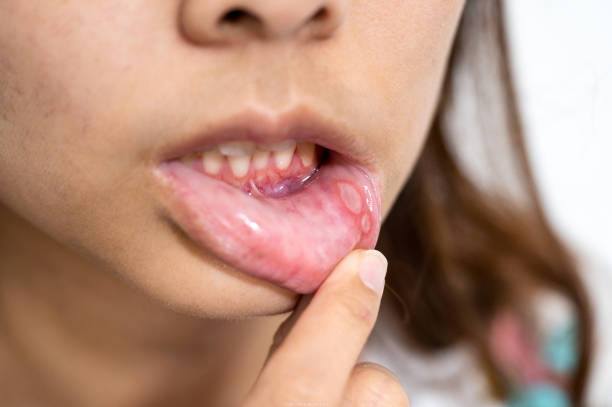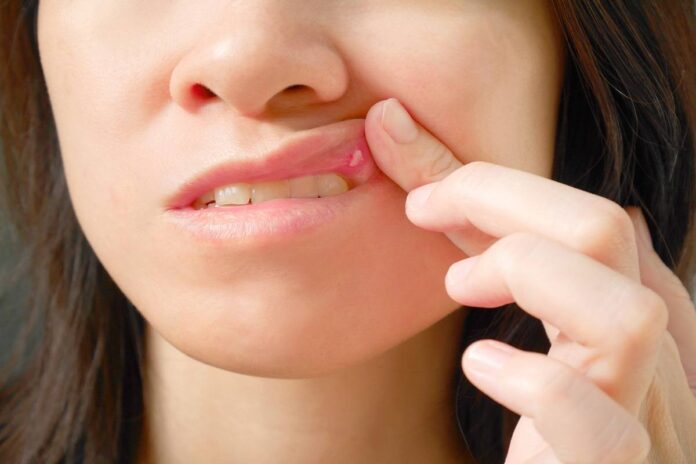A canker sore is often confused with a cold sore because they both usually occur in or around the mouth. But there are crucial differences—in appearance, causes, and specific locations.
Canker sores have bothered humanity since ancient times. Hippocrates coined the medical term for them—aphthous stomatitis—in Greece more than 2,500 years ago. These craterlike lesions can occur on or under the tongue or inside the cheek. The key symptoms are small white or yellow sores ringed by a red area on the tongue or inside the mouth or lips. Burning or tingling often precedes the appearance of the sore. Sufferers may also experience local pain when eating and talking, especially during the first two or three days.
It’s unclear whether canker sores have a viral origin, but they are not known to be contagious. Canker sores may also be a sign of an underlying disease such as ulcerative colitis.
Table of Contents
What causes canker sores?

No one is sure what causes canker sores, but there are several hypotheses. A specific bacterium or virus may be involved. Physical trauma—such as smoking, biting your tongue or the inside of your cheek, or using a hard-bristled toothbrush—may also play a role. Other potential causes include vitamin or mineral deficiencies (namely iron, zinc, or B vitamins) or a reaction to NSAIDs or certain other drugs.
Also Read: Should you pop a Blister?
Some people’s canker sores appear to be triggered by stress; however, stress can also be a side consequence. Some women discover that the lesions return after their periods, and heredity may play a part. It’s also thought that canker sores may be caused by a food allergy or sensitivity to foods such as chocolate, peanuts, strawberries, or tomatoes.
What if you do nothing?
Painful and irritating as they are, canker sores usually go away within 14 days, with or without treatment.
Also Read: What Are Mouth Sores And How To Cure Them?
Home remedies for canker sores
The following remedies may help ease discomfort:
- Ice it. Apply crushed ice to the sore. This will numb the pain and provide some relief.
- Avoid spicy foods. Spicy foods can irritate the sores, as can abrasive foods such as nacho chips and acidic foods like lemon and oranges.
- Brush carefully. Using a soft toothbrush will minimize irritation.
- Try over-the-counter pain relief. If canker sores become very painful, ask your pharmacist to recommend an anesthetic drug or protective gel to reduce pain and inflammation.
Preventing canker sores
It’s not clear how to prevent canker sores, but the following steps can help.
- Keep the mouth clean and healthy. Brush at least twice daily and floss regularly. And consider avoiding tooth cleansers that contain the detergent sodium laurel sulfate, which can aggravate canker sores.
- Stop biting. Any mouth injury can get infected, so if you unconsciously bite the inside of your cheek, try to break the habit.
- Avoid anything that can irritate your mouth’s lining. This includes hard-bristled toothbrushes, toothpicks, and bones in meat.
- Determine if specific foods trigger attacks. Eat less of the meals that seem to be causing issues.
- Visit your health care provider to determine if a nutritional deficiency might be playing a role.
When to call your doctor about canker sores
Contact your physician if the pain becomes severe or if you develop a fever. Also call your doctor if you develop four or more canker sores, if canker sores last longer than two weeks, or if you develop canker sores more than two or three times a year. If a canker sore is caused by your dentures or braces, consult your dentist or orthodontist to remedy the problem.
What your doctor will do
After a careful examination, your doctor may apply a topical anesthetic to relieve pain or may prescribe topical medications to reduce inflammation and prevent pain. A prescription for amlexanox (Aphthasol), a topical canker sore medication, can be worthwhile for recurrent sores, especially if used when you first feel burning or tingling before the sore appears. A topical corticosteroid ointment may be prescribed for short-term use. Your doctor may also suggest an alcohol-free mouth rinse containing chlorhexidine.
Also Read: Cold Sores (Fever Blisters): Causes and Treatments




